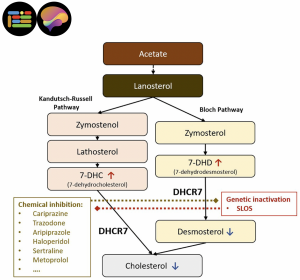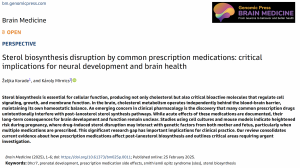
Common medications may affect brain development through unexpected cholesterol disruption
Groundbreaking review uncovers how common medications disrupt critical cholesterol synthesis in developing brains, sparking urgent pregnancy safety concerns
"What we've discovered is that many prescription medications, while designed for entirely different purposes, can inadvertently interfere with the brain's ability to produce and process sterols, including cholesterol," explains Professor Károly Mirnics, lead author of the review. "This is particularly concerning because the brain requires precise sterol regulation for proper development and function."
The research reveals that the brain, which contains 25% of the body's cholesterol despite representing only 2% of body weight, maintains its own independent cholesterol production system behind the blood-brain barrier. This process is essential for numerous developmental processes, including nerve cell connection formation and myelin production.
Dr. Željka Korade, co-author of the study, emphasizes that the risk may be heightened in certain populations: "We've found that individuals with specific genetic variations in sterol processing genes, which may affect up to 3% of the population, could be particularly vulnerable to these medication effects."
The review highlights several key findings with significant clinical implications:
• Over 30 prescription medications have been identified as having sterol biosynthesis inhibiting effects
• The combination of multiple medications may produce synergistic or additive effects on sterol disruption
• Genetic variations in sterol processing genes may increase susceptibility to these effects
• Multiple developmental periods, including pregnancy and early childhood, may represent vulnerable windows
"These findings suggest we need to reevaluate how we assess medication safety, particularly during pregnancy," notes Professor Mirnics. "The interaction between medications and sterol biosynthesis represents a previously underappreciated mechanism that could affect brain development."
The researchers emphasize that patients should not discontinue prescribed medications without consulting their healthcare providers. However, they recommend that additional research is needed to fully understand the implications of these findings and to develop more targeted approaches for vulnerable populations.
The full peer-reviewed Perspective (review) article, titled "Sterol biosynthesis disruption by common prescription medications: critical implications for neural development and brain health," is available on 25 February 2025 in Brain Medicine, offering readers a comprehensive examination of how commonly prescribed medications may inadvertently affect brain development through sterol biosynthesis disruption. The article is freely available online at https://doi.org/10.61373/bm025p.0011.
About Brain Medicine: Brain Medicine (ISSN: 2997-2639) is a peer-reviewed medical research journal published by Genomic Press, New York. Brain Medicine is a new home for the cross-disciplinary pathway from innovation in fundamental neuroscience to translational initiatives in brain medicine. The journal’s scope includes the underlying science, causes, outcomes, treatments, and societal impact of brain disorders, across all clinical disciplines and their interface.
Professor Károly Mirnics
University of Nebraska Medical Center
karoly.mirnics@unmc.edu
Visit us on social media:
Facebook
X
LinkedIn
Instagram
Other
Distribution channels: Culture, Society & Lifestyle, Education, Healthcare & Pharmaceuticals Industry, Science, Technology
Legal Disclaimer:
EIN Presswire provides this news content "as is" without warranty of any kind. We do not accept any responsibility or liability for the accuracy, content, images, videos, licenses, completeness, legality, or reliability of the information contained in this article. If you have any complaints or copyright issues related to this article, kindly contact the author above.
Submit your press release


